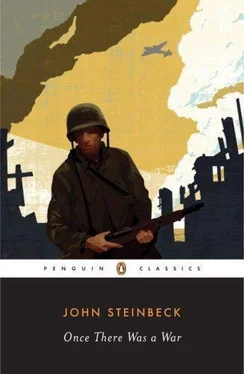John Steinbeck - Once there was a war
Здесь есть возможность читать онлайн «John Steinbeck - Once there was a war» весь текст электронной книги совершенно бесплатно (целиком полную версию без сокращений). В некоторых случаях можно слушать аудио, скачать через торрент в формате fb2 и присутствует краткое содержание. Город: New York, Год выпуска: 1960, Издательство: Bantam Books, Жанр: Классическая проза, на английском языке. Описание произведения, (предисловие) а так же отзывы посетителей доступны на портале библиотеки ЛибКат.
- Название:Once there was a war
- Автор:
- Издательство:Bantam Books
- Жанр:
- Год:1960
- Город:New York
- ISBN:нет данных
- Рейтинг книги:3 / 5. Голосов: 1
-
Избранное:Добавить в избранное
- Отзывы:
-
Ваша оценка:
- 60
- 1
- 2
- 3
- 4
- 5
Once there was a war: краткое содержание, описание и аннотация
Предлагаем к чтению аннотацию, описание, краткое содержание или предисловие (зависит от того, что написал сам автор книги «Once there was a war»). Если вы не нашли необходимую информацию о книге — напишите в комментариях, мы постараемся отыскать её.
Once there was a war — читать онлайн бесплатно полную книгу (весь текст) целиком
Ниже представлен текст книги, разбитый по страницам. Система сохранения места последней прочитанной страницы, позволяет с удобством читать онлайн бесплатно книгу «Once there was a war», без необходимости каждый раз заново искать на чём Вы остановились. Поставьте закладку, и сможете в любой момент перейти на страницу, на которой закончили чтение.
Интервал:
Закладка:
Corporal Harold is there, too. He has been loading bombs and seeing that the armament of the ship is in condition. The ground crew scurry about like rabbits. Their time is getting short. They have the obscure job, the job without glory and without publicity, and the ships could not fly without them. They are dressed in coveralls and baseball caps.
The gunners have mounted their guns by now and are testing the slides. A ground man is polishing the newly mended nose, rubbing every bit of dirt from it, so that the bombardier may have a good sight of his target.
A jeep drives up, carrying the officers — Brown, Quenin, Bliley, and Feerick. They spill a number of little square packets on the ground, one for each man. Captain Brown distributes them. They contain money of the countries near the target, concentrated food, and maps. Brown says, “Now, if we should get into any trouble don’t go in the direction of — because the people haven’t been very friendly there. Go toward — you’ll find plenty of help there.” The men take the packets and slip them in pockets below the knees in their coveralls.
The sun is just below the horizon now and there are fine pink puff clouds all over the sky. The captain looks at his watch. “I guess we better get going,” he says. The other Brown, the tail gunner, runs over. He hands over two rings, a cameo and another. “I forgot to leave these,” he says. “Will you put them under my pillow?” The crew scramble to their places and the door is slammed and locked. The waist doors are open, of course, with the guns peering out of them, lashed down now, but immediately available. The long scallop of the cartridge belts drapes into each one.
The captain waves from his high perch. His window sits right over the ship’s name— Mary Ruth, Memories of Mobile . The engines turn over and catch one at a time and roar as they warm up. And now, from all over the field, come the bursting roars of starting engines. From all over the field the great ships come rumbling from their dispersal points into the main runways. They make a line Like giant bugs, a parade of them, moving down to the take-off stretch.
The captain signals and two ground-crew men dart in and pull out the chocks from in front of the wheels and dart out again. The Mary Ruth guns her motors and then slowly crawls out along her entrance and joins the parade. Along the runway the first ship whips out and gathers speed and takes the air, and behind her comes another and behind another and behind another, until the flying line of ships stretches away to the north. For a little while the squadron has disappeared, but in a few minutes back they come over the field, but this time they are not in a line. They have gained altitude and are flying in a tight formation. They go roaring over the field and they have hardly passed when another squadron from another field comes over, and then another and another. They will rendezvous at a given point, the squadrons from many fields, and when the whole force has gathered there will be perhaps a hundred of the great ships flying in Vs and in Vs of Vs, each protecting itself and the others by its position. And this great flight is going south like geese in the fall.
There is incredible detail to get these missions off. Staff detail of supply and intelligence detail, deciding and briefing the targets, and personnel detail of assigning the crews, and mechanical detail of keeping the engines going. Bomb Boogie went out with the others, but in a little while she flutters back with a dead motor. She has conked out again. No one can know why. She sinks dispiritedly to the ground.
When the mission has gone the ground crews stand about looking lonesome. They have watched every bit of the take-off and now they are left to sweat out the day until the ships come home. It is hard to set down the relation of the ground crew to the air crew, but there is something very close between them. This ground crew will be nervous and anxious until the ships come home. And if the Mary Ruth should fail to return they will go into a kind of sullen, wordless mourning. They have been working all night. Now they pile on a tractor to ride back to the hangar to get a cup of coffee in the mess hall. Master Sergeant Pierce says, “That’s a good ship. Never did have any trouble with her. She’ll come back, unless she’s shot to pieces.” In the barracks it is very quiet; the beds are unmade, their blankets hanging over the sides of the iron bunks. The pin-up girls look a little haggard in their sequin gowns. The family pictures are on the tops of the steel lockers. A clock ticking sounds strident. The rings go under Brown’s pillow.
WAITING
BOMBER STATION IN ENGLAND, July 4, 1943 —
The field is deserted after the ships have left. The ground crew go into barracks to get some sleep, because they have been working most of the night. The flag hangs limply over the administration building. In the hangars repair crews are working over ships that have been Injured. Bomb Boogie is brought in to be given another overhaul and Bomb Boogie ’s crew goes disgustedly back to bed.
The crews own a number of small dogs. These dogs, most of which are of uncertain or, at least, of ambiguous breed, belong to no one man. The ship usually owns each one, and the crew is very proud of him. Now these dogs wander disconsolately about the field. The life has gone out of the bomber station. The morning passes slowly. The squadron was due over the target at 9:52. It was due home at 12:43. As 9:50 comes and passes you have the ships in your mind. Now the flak has come up at them. Perhaps now a swarm of fighters has hurled itself at them. The thing happens in your mind. Now, if everything has gone well and there have been no accidents, the bomb bays are open and the ships are running over the target. Now they have turned and are making the run for home, keeping the formation tight, climbing, climbing to avoid the flak. It is 10 o’clock, they should be started back—10:20, they should be seeing the ocean by now.
The crew last night had told a story of the death of a Fortress, and it comes back to mind.
It was a beautiful day, they said, a picture day with big clouds and a very blue sky. The kind of day you see in advertisements for air travel back at home. The formation was flying toward St. Nazaire and the air was very clear. They could see the little towns on the ground, they said. Then the flak came up, they said, and some Messerschmitts parked off out of range and began to pot at them with their cannon. They didn’t see where the Fortress up ahead was hit. Probably in the controls, because they did not see her break up at all.
They all agree that what happened seemed to happen very slowly. The Fortress slowly nosed up and up until she tried to climb vertically and, of course, she couldn’t do that. Then she slipped in slow motion, backing like a falling leaf, and she balanced for a while and then her nose edged over and she started, nose down, for the ground.
The blue sky and the white clouds made a picture of it. The crew could see the gunner trying to get out and then he did, and his parachute fluffed open. And the ball-turret gunner — they could see him flopping about. The bombardier and navigator blossomed out of the nose and the waist gunners followed them. Mary Ruth ’s crew was yelling, “Get out, you pilots.” The ship was far down when the ball-turret gunner cleared. They thought the skipper and the co-pilot were lost. They stayed with the ship too long and then — the ship was so far down that they could hardly see it. It must have been almost to the ground when two little puffs of white, first one and then the second, shot out of her. And the crew yelled with relief. And then the ship hit the ground and exploded. Only the tail gunner and ball-turret man had seen the end. They explained it over the intercom.
Читать дальшеИнтервал:
Закладка:
Похожие книги на «Once there was a war»
Представляем Вашему вниманию похожие книги на «Once there was a war» списком для выбора. Мы отобрали схожую по названию и смыслу литературу в надежде предоставить читателям больше вариантов отыскать новые, интересные, ещё непрочитанные произведения.
Обсуждение, отзывы о книге «Once there was a war» и просто собственные мнения читателей. Оставьте ваши комментарии, напишите, что Вы думаете о произведении, его смысле или главных героях. Укажите что конкретно понравилось, а что нет, и почему Вы так считаете.









